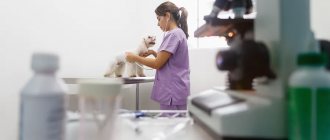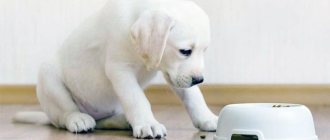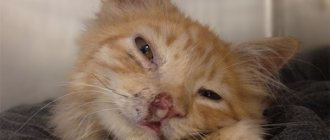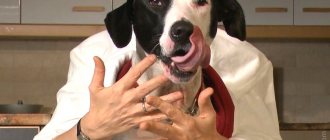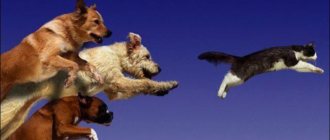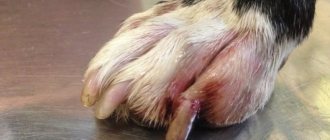In this article I will talk about the reasons why dogs refuse to drink and eat. I will describe the dangers associated with insufficient food and fluid intake, the reasons why you don’t drink water, and what to do even if your nose is cold. Why is the dog lethargic and lying down, no appetite, constantly sad and how to treat it. Let me explain when it is necessary to contact a veterinarian. I will give the norms for water consumption and how much to drink for the animal.
Water is a chemical element necessary and indispensable for the health and functioning of a living organism. Participates in all life processes: structure, development, metabolism, removal of toxins, etc.
Reasons why the dog began to refuse food and water
There are many reasons why an animal may suddenly stop drinking and eating.
For example:
- diseases of the oral cavity, manifested by inflammatory processes that are accompanied by pain (laryngitis, stomatitis, mucosal injuries);
- pharyngeal spasms, a violation of the physiology of the swallowing process, are associated with a number of viral and autoimmune diseases;
- general diseases of the body (can get sick: kidney failure, diabetes, cancer), will not get up and not drink;
- dyspnea;
- overheating of the body, lethargy;
- diseases of the gastrointestinal tract (inflammatory processes, obstruction, diarrhea, constipation);
- parasitic infestations;
- poisoning of the body (severe intoxication);
- acute course of the disease associated with a high rise in body temperature, severe weakness of the body;
- obstruction of the esophagus caused by stuck foreign objects;
- small or advanced (old) age of the dog;
- dirty, musty water in a bowl, smelling unpleasant;
- inconvenient location of the bowl (high or low);
- poor quality of drinking and food utensils that emit unpleasant chemical odors, then he neither eats nor drinks anything.
If a dog does not drink enough or does not drink at all, then its body becomes dehydrated.
Please note that small dogs, particularly puppies, are more fragile and more susceptible to environmental influences.
The immunity of small dogs is weaker than that of adults and large dogs, and interruptions in health and well-being occur more often.
Lack of water and nutrients in the body has the most profound effect.
Treatment of lethargy in dogs
If you have a depressed dog with signs of lethargy that is not typical of his temperament, you should see a veterinarian.
Doctors at the clinic will most likely perform a thorough clinical examination, as well as ask questions about your dog's recent behavior and past veterinary care, and collect a medical history. The doctor will draw up a list of differential diagnoses based on your medical history and clinical picture. In most cases, diagnostic tests such as blood, urine, and stool tests will be performed to rule out or confirm the likely illness that is causing the depression symptom. Your veterinarian may also perform an X-ray, an ultrasound scan, and an electrocardiogram to check for heart problems.
Fluid intake norms for an animal
The daily water intake for a dog depends on its weight, physical activity and time of year.
With a fairly active lifestyle in normal, not hot weather, 1 kg of dog’s body weight should include 20-70 ml of clean water per day.
In cases where the dog is undergoing intense training, is in a hot climate, or is ill with an increase in body temperature, the volume of fluid should be increased two to three times.
The daily water intake does not include liquid food and other drinks other than clean drinking water.
The animal needs to drink a certain amount of fluid every day
The puppy sleeps almost all the time
Newborn puppies sleep 90% of the time. They only wake up to eat. For the first 48 hours, they sleep upside down and whine, which helps build muscle tone.
© shutterstock
As they mature, they begin to go through various phases similar to ours.:
- When they begin to doze, they are attentive to their surroundings and respond to stimuli. This is a transitional state between wakefulness and sleep. Their eyes move up and down and can even open and close.
- After some time, they enter a state of light sleep, in which the heart rate slows and sleep is deep. If he is awakened in this phase, he will not remember falling asleep. The process of auditory inhibition begins to activate, which prevents the subject from waking up.
- After this phase, another phase of deep sleep begins, in which the breathing rate is slow and dreams do not occur. It is during this phase that restorative rest occurs, as well as the processes of memory consolidation and learning.
- Finally, the so-called REM phase occurs, characterized by a lot of brain activity that produces dreams. This is a state similar to being awake. Rapid, synchronized brain waves and loss of muscle tone occur. We can observe that our puppy moves his legs and ears. Eyes move in all directions.
Puppies sleep almost all the time , this is absolutely normal. During the first 12 weeks of life, they can sleep 18 to 20 hours a day, waking only to feed and going straight to sleep. This is because their body is developing. Starting at 12 weeks, the puppy begins to have more and more periods of activity.
It is important not to wake your puppy when he is sleeping as he needs these hours of sleep to develop properly. Be patient, from the age of three months he will begin to be more playful.
Dangers of not eating and drinking
Exhaustion and dehydration are conditions that are dangerous to the health and life of animals.
They affect the body as follows:
If the reason is related to health, then you need to show the dog to a veterinarian as soon as possible.
Depression in dogs
Just like people, dogs can suffer from mental health problems such as depression. Depression in dogs is usually caused by major changes in their environment and behavior, such as the loss of their owner or another pet, a child or partner, moving, moving into their home, or indeed, you and your dog moving to a new home. Chronic boredom can also lead to depression in dogs, as well as dermatological problems such as paw licking syndrome.
Signs of depression in dogs may include a less playful mood, less interaction with other dogs, lack of appetite, a less sociable personality, and chewing or licking of paws. Fortunately, as long as they are given plenty of love, care and attention, most dogs will survive depression within a week or two.
^Top
Signs of exhaustion and illness
In order to solve the problem of a dog refusing to eat and drink, it is necessary to establish the cause.
To begin with, it is advisable to try to do this yourself. First of all, check the quality of the water in the bowl and the material of the container from which the dog drinks. Drinks for your dog should always be fresh, purified and at room temperature. It is advisable to use ceramic dishes. Rinse thoroughly after washing with cleaning products.
If this is not the reason and there are symptoms of the dog’s poor health, illness, exhaustion, you should contact a veterinary clinic for advice. An experienced specialist will be able to correctly diagnose the disease and prescribe treatment for the dog. In the hospital, the pet will be given a drip with glucose and saline, which will significantly improve the situation and give the animal strength.
Dehydration of the body leads to disruption of all organ systems, accumulation of toxins and other serious consequences.
You cannot put off solving such a problem and let the situation take its course.
The body can become exhausted and poisoning, dehydration and a general deterioration in well-being can result in vomiting when forcibly dehydrated. Which in turn will only worsen the situation. Therefore, you should not pour water into it against the will of the dog.
When dehydrated, a dog loses its appetite, becomes lethargic, and has sunken eyes.
What to tell your veterinarian at your appointment
The cat is lethargic, sleeps all the time and eats little: what to do
When visiting a specialist, the owner must describe in detail all the clinical signs observed at home and the time of their appearance. It is important to talk about the events that preceded the change in the pet’s well-being (increased activity, eating garbage on the street, close acquaintance with stray animals, etc.). A preliminary diagnosis is made from the words of the owner, and the final diagnosis is made after laboratory and instrumental diagnostics.
There are a large number of factors that cause unusual behavior in pets. If it is impossible to determine the source of the disorder on your own, then you need to stop self-medicating and seek help from the nearest veterinary clinic.
Medicines
A wide range of medications for dogs can make your pet lethargic or weak. If you notice weakness after starting a new flea or heartworm medication, call your veterinarian immediately.
Many human medications, such as ibuprofen, are toxic to pets. They can lead to weakness, lethargy and even death. Therefore, always keep human medications out of your pet's reach.
If you drop a pill, pick it up immediately - before your dog does. Also, rest assured that any medications you throw in the trash won't reach your dog.
When to see a doctor
An animal can go without food for quite a long time. As a rule, 1 or 2 days of fasting does not have a detrimental effect on the health of the pet, but if the dog refuses food for more than 2 days, loss of appetite is accompanied by other signs, the alarm should be sounded - the animal is sick.
Immediate assistance from a veterinarian is required if loss of appetite occurs with the following symptoms:
- feverish conditions;
- diarrhea (with mucus, blood);
- pallor, yellowing of the mucous membranes;
- purulent discharge from the nose, eyes;
- vomiting with blood, bile, foam;
- unsteadiness of gait, convulsive conditions;
- severe pain in the animal's body;
- constant lying of the dog on one side;
- disturbance of the urination process (increased, decreased or complete cessation of urination);
- refusal of water.
Some owners, on the advice of their friends or relatives, begin to self-medicate the animal and make fatal mistakes. One of the most common tips for a quick recovery for a pet is to pour vodka into the dog’s mouth. This should not be done under any circumstances, because an alcohol-containing liquid will not cure a sick dog, but will cause a burn to the mucous membrane of the esophagus and stomach.
A dog that has no health problems will have an excellent appetite. In cases where an animal is bothered by something and refuses any food or even treats, immediate action must be taken. Treating your pet yourself using medications intended for humans, as well as traditional medicine recipes, is strictly prohibited. A sick friend must be shown to a veterinarian, who, based on the diagnosis, will select an effective treatment for the animal and return the dog to a good appetite.
Methods for normalizing appetite
In cases where the lack of appetite and drowsiness are not caused by pathologies, the pet’s appetite can be normalized by the following measures:
- skipping several meals to make the animal hungry;
- increased strength of physical activity, large breeds, German shepherds, Labradors, need to move more than decorative animals;
- providing long and frequent walks;
- introduction of new products into the diet.
Additional Information! A secret that will help awaken the appetite is to feed your pet a piece of lightly salted fish 10-15 minutes before feeding. This is an effective method to stimulate hunger.
